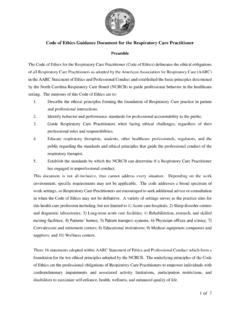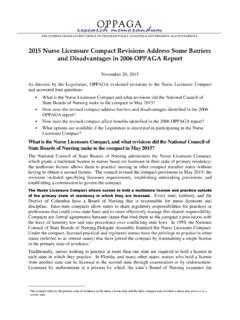Transcription of Respiratory Staffing Position Statement …
1 north carolina Respiratory CARE board 1100 Navaho Drive, Suite 242 Raleigh, NC 27609 Approved by the north carolina Respiratory Care board - January 12, 2012 Page 1 of 10 Position Statement Respiratory CARE Staffing LEVELS The north carolina Respiratory Care board is issuing this Position Statement to provide guidance about the board s interpretation of the Respiratory Care Practice Act ( the Act ) and the board s Rules, as the Act and Rules relate to the establishment of Respiratory Staffing levels. The board is issuing this Position Statement after receiving a request for Declaratory Ruling from the north carolina Respiratory Care Managers Group, and after determining that the members of the Managers Group are not aggrieved by the provisions of the Act and the board s Rules that were cited in the request. This Position Statement illuminates an area of concern by the board in regard to Respiratory Care Staffing levels and provides general guidance on that subject to the board s licensees and to other health providers.
2 In issuing this Position Statement , the board is not making a determination that any individual or organization has violated the Act or its Rules, or that a particular course of action violates the Act or the board s Rules. It is simply presenting general principles that it believes should be considered in establishing Respiratory Care Staffing levels. Therefore, issuance of this Position Statement does not constitute an adverse determination affecting any individual or organization. The board will not initiate disciplinary action against a licensee, or other action against organizations or unlicensed individuals, based on Respiratory Care Staffing levels unless it receives specific information about a particular course of conduct, and only after due consideration and assessment of the specific information that is received. This Position Statement will be posted on the board s website, but as it continues to exercise its statutory responsibilities, the board reserves the right to change or supplement this Position Statement based on future developments or situations that come to its attention.
3 BACKGROUND AND PURPOSE This Position Statement is being issued in response to a concern raised by various Respiratory Care Practitioners, including the north carolina Respiratory Care Managers Group. The concern, as it has been expressed to the board , is that organizations are applying a limited spectrum of Staffing measurement standards to project the number of full-time equivalent (FTE) staff needed to provide Respiratory services to patients, in some cases based on recommendations from outside consultants to the organizations. In particular, and based on information furnished to the board , some organizations are setting their Respiratory staff levels by: (1) relying exclusively on billable procedures based upon Current Procedural Terminology (CPT) codes or other standard billing protocols; (2) using standardized models that are derived solely from general data such as patient days, or average daily census; or (3) applying industry-wide benchmarking criteria.
4 This issue was presented to the board by the north carolina Respiratory Care Managers Group ( the Managers Group ) in a Request for Declaratory Ruling. Members of the Managers Group supervise their staffs and are responsible to ensure that the persons who act under their Approved by the north carolina Respiratory Care board - January 12, 2012 Page 2 of 10 supervision provide appropriate Respiratory care services. Therefore, the Managers Group was concerned that they might be affected by the board s application of Gen. Stat. 90-659(a)(1)(d), to the Staffing levels in the institutions where the members work and supervise others. That portion of the Act prohibits health care practices that are determined to be hazardous to public health, safety, or welfare. There also are related provisions in the board s rules at 21 NCAC 61 .0307(10) and (13). The Managers Group asked the board to issue a declaratory ruling to address the standards, metrics, and Staffing systems that may be used to safely and cost-effectively set Staffing levels in hospital Respiratory Care Departments in this state.
5 As noted above, the board declined to issue the ruling that was requested because it determined that the members of the Managers Group were not aggrieved by the application of the cited portions of the Act or the board s Rules. However, the board determined that based on the information that was submitted or available to it, the Managers Group had raised a significant issue that merited attention in a Position Statement . THE MATTERS AT ISSUE Detailed information on the scope and depth of the Staffing level issue was obtained in a state-wide survey of Respiratory Care Department Managers that was conducted in June of 2011. This study sought to determine the current Staffing metrics and Staffing patterns in use, and to derive some general information about the effects of the resulting Staffing levels on patient care. Thirty-five Respiratory Care Managers from approximately 150 NC Hospitals responded to the survey, constituting approximately a 23% response rate.
6 The survey results are described in detail in Appendix A and in general, they demonstrate Staffing level concerns of the Respiratory Care Managers responding to the survey. The information obtained in this survey, though admittedly incomplete, presents a very serious and significant issue which can have a direct impact on patient safety. Therefore, the board has determined that it should issue this Position Statement . Position Statement A. Respiratory Staffing Levels Can Have a Direct Impact on Patient Safety. Although the board does not have authority over the conduct of institutions with Respiratory Departments and their Staffing levels, the board clearly has been granted explicit statutory authority over the practice of Respiratory care. This grant of authority is based on the fundamental premise enunciated by the General Assembly in the Act, that the practice of Respiratory care in the State of north carolina affects the public health, safety and welfare.
7 Gen. Stat. 90-647. Further, there is a broad recognition in the health care industry that Staffing levels are a compliance issue for the institutions that offer Respiratory Care. The Centers for Medicare and Medicaid (CMS) require in its Conditions of Participation for Respiratory Care Services that there must be adequate numbers of Respiratory Therapists and other personnel who meet the qualifications specified by Medical Staff, consistent with State law . Approved by the north carolina Respiratory Care board - January 12, 2012 Page 3 of 10 The number and qualifications of the Respiratory care staff who work at an organization at any given time certainly can have a direct and substantial impact on the quality of Respiratory care that will be provided. Pursuant to its statutory authority and the legislative mandate, the board has adopted rules that address the individual qualifications and assignment of Respiratory care practitioners and those rules forbid the assumption, or the delegation, of duties for which a Respiratory care practitioner is not well qualified.
8 The sheer number of Respiratory Care Practitioners who are available to provide services can have a profound and direct impact on the quality of care. Therefore, in adopting this Position Statement relating to Respiratory Care Staffing levels, the board is acting well within its statutory authority. B. Any Metric, Model, or System that is Used to Define Respiratory Staffing Levels Should Recognize and Account Appropriately for All the Activities Required of a Respiratory Care Practitioner During the Relevant Period. Measurements that forecast the levels of Respiratory Staffing required should recognize and account for all of the activities in which Respiratory care practitioners can reasonably be expected to be engaged. The information submitted to the board indicates that some organizations may engage in one or more of the following approaches to establish Respiratory Care Staffing levels: Relying solely on CPT codes or other standards that only define activities that may be billed to a patient or third-party payor; Relying on other internal measures that do not embrace all of the activities required of Respiratory Care Practitioners during a particular time period; Relying on general, undifferentiated measures such as procedure counts, which fail to include varying time required to perform different procedures.
9 One procedure such as measuring peak expiratory flowrate, may take 5 minutes to perform, whereas another procedure, such as bronchoscopy assistance, may take 70 minutes to perform; Limiting the number of repetitive actions per patient in a unit of time to a level that does not accurately reflect a realistic level of involvement; Including fixed time spent for management, supervision, education, meetings, research, and support activities in variable, direct patient care productivity measures; and Setting Staffing levels by benchmarking with other institutions that have adopted one or more of the foregoing approaches, or using inaccurate data from external proprietary consulting companies which has not been validated, or without appropriately accounting for differences in department services or patient acuity levels.
10 Any of these approaches can lead to an insufficient level of Respiratory Care Staffing , or inappropriate use and allocation of staff resources. For instance: An exclusive focus on CPT codes or other standards that only defines activities that may be billed can lead to the omission of a large number of non-billed activities from the total Respiratory Care staff time that may be required, including each of the following, among others: Adult Transcutaneous monitoring during High Frequency Oscillatory Ventilation; Approved by the north carolina Respiratory Care board - January 12, 2012 Page 4 of 10 Airway Management Procedures (suctioning, monitoring cuff pressure, manipulation of specialty airways, and application of airway attachments such as speaking valves; Apnea Testing for Brain Death; Arterial Line Insertion; Assessment/Screening Patients for Obstructive Sleep Apnea; Assessments of Patients; Attendance at High Risk C Sections and Deliveries; Cardioversion Monitoring of the Patient.)



